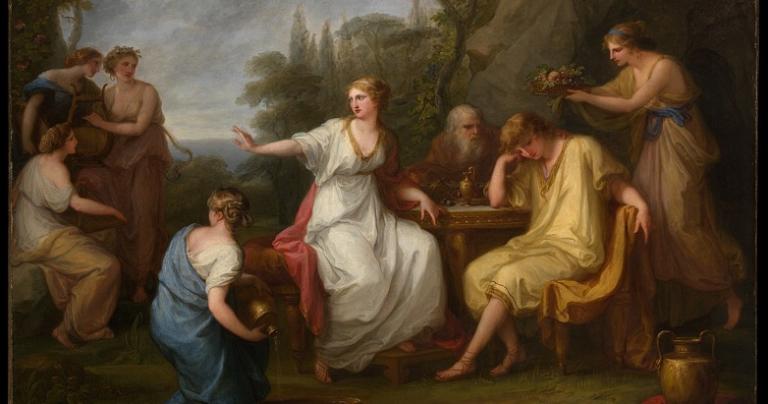
Sometimes life makes becoming an adult hard. Everything conspires to keep a boy from becoming a man and then everyone sniffs at him for not growing up. The solution is not to browbeat the lad, but to find him a Mentor who can send him out on a journey.
Or so suggests Homer at the start of his Odyssey which pictures a young person somewhere in his twenties who needs help reaching maturity. Homer does not sneer, criticize, or send a series of inspirational quotes to his young character. Telemachus, trapped in the role of a child by the times, is not primarily to blame:
Dad goes to war for ten years, starts for home and is missing for another ten years. Homelife goes bad with everyone in the area wanting to marry his mother to get the estate. Mom is powerful and holds off the bad guys for a decade and Telemachus waits for Dad.
He doesn’t look like he is coming, but until he is dead, you are Prince Charles waiting long past the expiration date of boyish or charming. Like a college graduate loaded with debt and facing a stagnant economy when he first comes out of college, Telemachus wants to do his job, but nobody wants him or is there to train him.
The good news is that by the end of Odyssey, Telemachus is ready to string and bend Dad’s bow. He does not have to do so, because Odysseus, the hero father, is home, but Telemachus could. In the fight to purify Ithaca, Telemachus is an ally to his father and no longer a child.
Despite the odds, he has become a man.
How? Homer gives us a plan for education that is detailed, but there are a few big ideas in Book I of the Odyssey that must not be missed if we are to have any hope of becoming adults ourselves!
Telemachus is sad, but looking for a way forward.
The first reference to Telemachus finds him in his dysfunctional home full of sorrow. The good news is that Athena, in the form of Mentor, is coming to help. The goddess of War and Wisdom is just what Telemachus needs, though in a form that will not consume him. She comes quietly and helps gently at first. He is worth helping, because despite the seeming hopelessness of his life:
132 First by far to see her was Prince Telemachus, sitting among the suitors, heart obsessed with grief. He could almost see his magnificent father, here . . . in the mind’s eye —if only he might drop from the clouds and drive these suitors all in a rout throughout the halls and regain his pride of place and rule his own domains! Daydreaming so as he sat among the suitors, he glimpsed Athena now 140 and straight to the porch he went, mortified that a guest might still be standing at the doors.*
He sees her “first by far!” There is much in this passage, but notice that Telemachus has done what he could do in this bad situation and he has keen vision. He is looking for what he can do.
Telemachus is trying and doing what he can. He is ready to be mentored.
The suitors are barbarians and Telemachus does not have the power to remove them. He is trapped by the social, political, and economic system into a boy’s role, but his man’s mind keeps holding the norms of civilization. He refuses to ally with the brutal power of the suitors. He seeks no mentor there. Instead, when he sees a guest waiting at the door, he is “mortified” and goes to be a host.
He cannot be king, but he can be a host.
In his sorrow, Telemachus needs reassurance first, not criticism.
Some student readers want to shake Telemachus and tell him to do something. This is not the reaction of wisdom to his deep sorrow:
132 First by far to see her was Prince Telemachus, sitting among the suitors, heart obsessed with grief. He could almost see his magnificent father, here . . . in the mind’s eye —if only he might drop from the clouds and drive these suitors all in a rout throughout the halls and regain his pride of place and rule his own domains! Daydreaming so as he sat among the suitors, he glimpsed Athena now 140 and straight to the porch he went, mortified that a guest might still be standing at the doors.
Wisdom sends him on a quest. He is given something to do that will enable him to more forward.
Mentor does not just talk to Telemachus. She gives him a quest. Education must move and do or no change can happen. Telemachus will gather information and travel:
320 For you, I have some good advice, if only you will accept it. Fit out a ship with twenty oars, the best in sight, sail in quest of news of your long-lost father.
We must not forget that for centuries travel and education have been linked. Let us make sure that in our haste to credential we leave time for travel.
Wisdom tells Telemachus to “grow up” in the context of a positive set of actions.
Mentor sketches out a plan. Telemachus will look for news about his father. If Dad is dead, then he can return and fight best he can for his kingdom. If he finds his father, then he will have found certain victory. In any case:
341 You must not cling to your boyhood any longer — it’s time you were a man.
Many want to rush to tell Telemachus this, but Mentor (Wisdom disguised) does so only in the context of helping. As a result, the response is gratitude and not defensiveness. Mentor gives Telemachus courage and he immediately goes to war with the evil men who threaten his mother. When he sees his mother is in danger:
Telemachus took command: “You suitors who plague my mother, you, you insolent, overweening . . . for this evening let us dine and take our pleasure, no more shouting now. What a fine thing it is to listen to such a bard as we have here — the man sings like a god. But at first light we all march forth to assembly, take our seats so I can give my orders and say to you straight out: 430 You must leave my palace! See to your feasting elsewhere, devour your own possessions, house to house by turns. But if you decide the fare is better, richer here, destroying one man’s goods and going scot-free, all right then, carve away! But I’ll cry out to the everlasting gods in hopes that Zeus will pay you back with a vengeance —all of you destroyed in my house while I go scot-free myself!”*
He is not yet come into his own, but he will. He has been given a means to escape sorrow and Telemachus seizes the chance.
This made me think:
Perhaps, we are, just now, all of us in difficult times. We are not heroes, but children, grandchildren, or great-grandchildren of heroes. We are in a city we did not build, might not be able to build, and that place is overrun with barbarians. Perhaps in our sorrow we need keen eyes to look for the ignored stranger, the alien guest, and see what wisdom God might have sent.
Lord Jesus Christ, son of God, have mercy on me a sinner.
—————————
All quotations taken from Odyssey as translated by Fagles.













